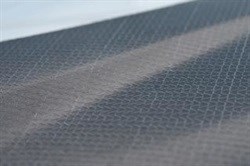
Top stories






More news

















The companies will be part of the newly formed Institute for Advanced Composites Manufacturing Innovation, created by the US government.
"Our collaboration with DowAksa and participation in this organisation significantly boosts what we are able to achieve," said Ken Washington, vice-president of Research and Advanced Engineering. "We have a true alliance of highly talented people working to take automotive materials to the next level."
The mission of the institute and the goal of Ford's collaboration with DowAksa - a 50/50 joint venture between The Dow Chemical Company and Aksa Akrilik Kimya Sanayii AS - is to overcome the high cost and limited availability of carbon fibre, while developing a viable, high-volume manufacturing process.
"This opportunity builds upon Ford's current joint development agreement with Dow Chemical and accelerates our time-line to introduce carbon fibre composites into high-volume applications," said Jim de Vries, global manager of Materials and Manufacturing Research. "This collaboration helps us accelerate our efforts to create lighter automotive-grade composite materials that benefit customers by enabling improved fuel economy without sacrificing strength."
Ford and Dow Chemical began working together in 2012 to develop low-cost, high-volume carbon fibre composites. Also in 2012, the European Ford Research and Innovation Centre in Aachen, Germany, investigated new production processes to reduce cycle times for carbon fibre components through the Hightech.NRW research project.
Engineers in Aachen work closely with their colleagues in the US on a wide range of projects involving advanced materials and carbon fibre, including collaborative research into corrosion and corrosion-fatigue analysis of joints with metals supporting the use of carbon fibre-reinforced plastic parts in mixed material bodies.
"DowAksa's technology and manufacturing expertise will help effectively overcome barriers to entry for the use of carbon fibre composites in high-volume automotive applications," said Douglas Parks, DowAksa board member and a primary participant in the founding of the Institute for Advanced Composites Manufacturing Innovation. "The new institute provides a collaborative platform to accelerate our progress."
Carbon fibre composites have been used in aircraft and racing cars for decades because they provide high strength with extremely low weight. It is possible to tailor strength properties to a specific component - making it as stiff or flexible as needed for a given application.
"Our goal is to develop a material that can greatly reduce vehicle weight in support of improved fuel economy for our customers," said Patrick Blanchard, Ford supervisor, Composites Group. "The flexibility of the technology allows us to develop materials for all vehicle subsystems across the product line - resulting in a weight savings of more than 50% compared to steel."